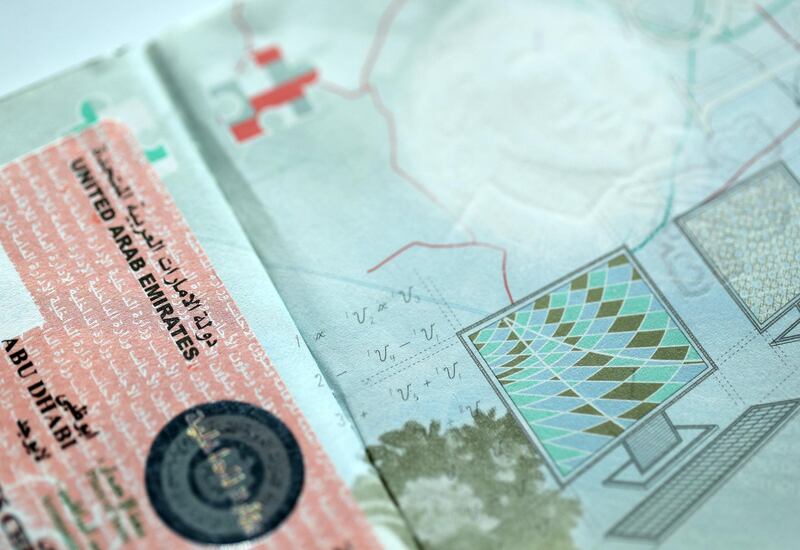The UAE's new good conduct certificate system is likely to slow down the rate that employees are hired - but is the necessary next step in tightening the visa system, experts have said.
As of February 4, the government will require anyone moving to the UAE to work to produce a 'good conduct and behaviour certificate' or police clearance letter.
This will serve as proof that the individual has never been convicted of a crime.
“The certificate will list any previous criminal convictions,” says Anirban Chatterji, a senior manager at PwC's Dubai office.
“The UAE authorities will then adjudicate on whether to grant a visa on a case by case basis based on whether they consider the crimes listed as serious enough to warrant a rejection of the visa. A predefined list of crimes that would lead to rejection has not been issued as a guide for UAE employers.”
A briefing document released by PwC on the topic last month said the introduction of good conduct certificates will inevitably have an impact on the recruitment process.
“Companies operating in the UAE should note that the introduction of this requirement amends the work authorisation process for foreign national employees and adds to the total lead times to procure a visa,” says the document.
____________
Read more on good conduct:
The National's good conduct guide: expats won't need letter to change jobs yet
How to obtain a good conduct certificate ahead of UAE's new visa rules
____________
Mr Chatterji says while this additional lead time will make the process more “cumbersome,” it is unlikely to create unexpected obstacles for some of the larger companies as internal screening processes should have already flagged individuals with previous criminal convictions.
Some business owners said they already ask for checks to make sure employees have a clean record.
“If you are employing an accountant and you found out that there had been a fraud allegation against them - and they had been in prison in their home country - you are never going to find that out through their CV," said Maria Inglis, partner at Advantage Sports, a sports coaching company operating in Dubai and Abu Dhabi.
The company makes all of its staff undergo a criminal status check every 12 months, regardless of the previous or new visa system.
"The only way you are going to do that is by a criminal status report,” .
"We work with a lot of children. So we make it a mandatory requirement internally."
At present, individual companies and the authorities can check to determine if there is an Interpol arrest warrant out for someone applying for a visa. But they wouldn't necessarily find out if the applicant had been convicted of a crime in their home country and paid a fine or served their sentence.
The UAE is joining a number of countries that demand a police clearance letter, including Australia, Belgium, Canada, Cayman Islands, New Zealand, South Africa and the United States in some cases.
Harish Bhatia, partner for Korn Ferry Hay Group Middle East, a management consulting firm, says background checks for prospective employees are becoming standard in developed countries.
“In our case that has to be done by a good conduct certificate, because people are coming from different parts of the world," he said.
“It’s a step towards moving towards a more professional employment base,” adds Mr Bhatia.
There are still, however, many unknowns, including what will constitute a ‘pass or a fail,’ say experts.
One recruitment consultant said he expected jobseekers who have lived in several countries over five years to be expected to get a clearance letter from each - though the authorities are yet to clarify that.

“If you are moving over from your home country you have to get one from there,” says Toby Simpson, a director at The Gulf Recruitment Group.
“However, if you have been an oil and gas worker and you have [been a resident] in Azerbaijan, Kuwait, Saudi, the UAE and Texas, then you need to go and get five good behaviour certificates.”
Mr Simpson says many other countries require their employees to obtain the equivalent of a good conduct certificate for certain positons, such as with the police force in the UK.
“You have also been able to get [good conduct certificates in the UAE previously], but it’s rare that employers would have actually asked for them in the past,” said Mr Simpson.
Prema Muralidharan, office manager with Arabian Attestation, based in Dubai, has already received calls from concerned jobseekers seeking clarity on the process.
Her company handles the attestation of documents, such as marriage certificates. It sends documents to UAE embassies and home foreign ministries abroad and returns them to the UAE for a fee.
The cost, she says, will depend on the country in question.
“If it’s from India it will cost Dh600,” she says, adding that it is not yet clear how much it will be to attest good conduct certificates elsewhere.







